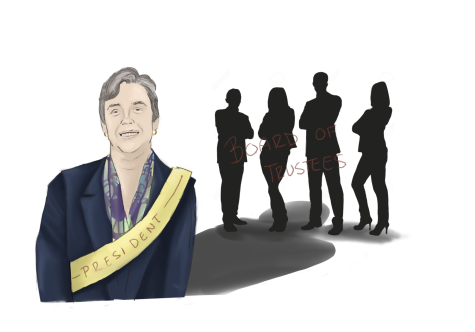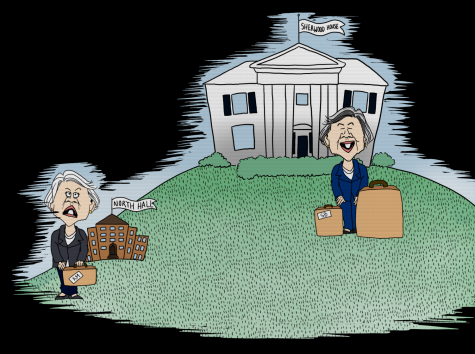Responding to Whitman’s Forbes Ranking Drop
December 5, 2017
When the Forbes list of “America’s Top Colleges 2017” was released this August, Whitman was ranked #78. This is a drop of 25 spots from our rank of #53 in 2016. Whitman Ranking Infographic
This drop in rankings doesn’t necessarily mean Whitman experienced a corresponding drop in quality from 2016 to 2017, but this shift does draw attention to the role that college rankings play at institutions like Whitman. Each year, organizations like US News and Forbes release a list of top college rankings based on statistics they acquire from the schools, as well as peer reviews between institutions on the list.
Criticisms of these all-encompassing college ranking lists are common. Many educators and administrators take issue with the varying methodologies between the lists and their attempt to compare large state universities with liberal arts colleges as part of the same list. Colin Diver, the president of Reed College, spoke to this idea in an op-ed for the Atlantic, “One-size-fits-all ranking schemes undermine the institutional diversity that characterizes American higher education.”
Josh Jensen, Vice President for Enrollment and Communications at Whitman, echoed Diver’s statements about rankings taking away the incentive for diverse types of schools.
“I think for the most part when you try to distill the value of an institution down to a single number, you’re ultimately doing some harm. The truth is, one of the great advantages that American higher education has is an incredible amount of diversity in the kinds of institutions we have. I think that’s a real asset to our system,” Jensen said. “When you start to rank those [institutions] and just give them one numeric score, you start to lose the concept that actually every student is going to have different needs.”
Despite this, the role that these rankings play at schools can be significant. “Institutionally we have no choice but to pay attention to these rankings because we know that some of our prospective students and their parents pay attention to them,” said Kathy Murray, President of Whitman. Although Whitman does take note of their rankings each year, Murray says that she doesn’t mention the US News ranking when talking to prospective students and their families. “Sometimes I talk about the ranking where we’re occasionally the happiest campus,” Murray said. “I think that’s kind of fun.”
Reed College, a school similar in size and reputation to Whitman, has declined to fill out the US News ranking forms since 1995. Diver spoke in his op-ed about how rankings penalize schools that are different and turn away from institutional homogeneity. “In the words of another of my fellow presidents, ‘The rankings are merely intolerable; unilateral disarmament is suicide.’ Far from committing suicide, Reed College has survived,” Diver says. The same op-ed states that the first 10 year period from 1995-2005 of not cooperating with US News, Reed saw a 27 percent increase in applications.
Murray spoke about why Whitman won’t take the same path as Reed with ignoring the ranking system. “Reed has such a distinctive niche in the small liberal arts college world, that it sort of fits with that counterculture, right? ‘No, we’re not going to participate.’ I don’t see Whitman doing that. It has the potential to do harm,” Murray said.
This potential harm could come in the form of prospective students or parents seeing Whitman perform a certain way in the rankings, and deciding not to apply. Since Whitman is such a small school, the number of applicants each year is important to maintain. Jensen spoke to why Whitman continues to provide the information for the rankings, “[The rankings] do serve a function. They provide an opportunity for families who, in a whole range of contexts, need to compare institutions, and they’re one way that families can do that.”
When asked what she would say to a prospective student who sees that Whitman is number #78 on a ranking list, President Murray replied, “I hope you will come and visit this campus and get to know us better than Forbes did. Make a decision on whether this feels like the right place for you to be, I don’t think Forbes should be deciding that for anybody.”










